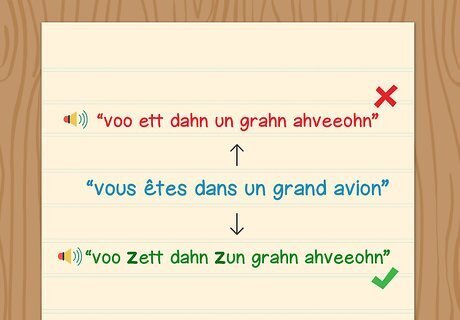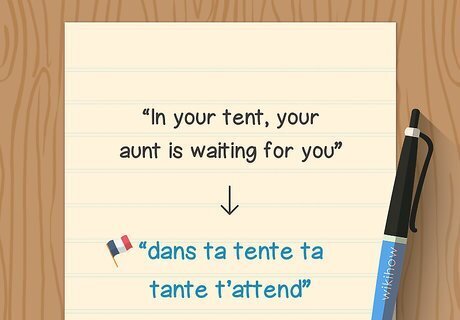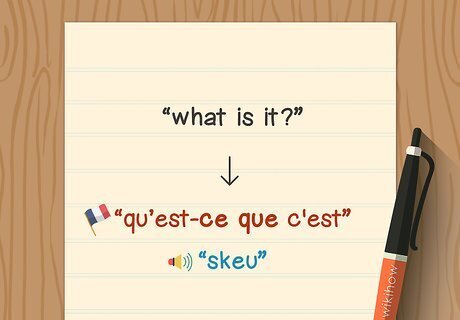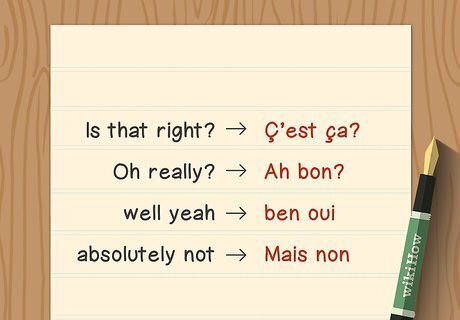
views
Practicing Pronunciation

Control your tongue movement when saying French words. Due to the lack of diphthongs in French, your tongue moves a lot less than it would if you were speaking English. Too much tongue movement will make your speech sound more heavily accented. Try putting the tip of your tongue against the back of your lower front teeth as you speak. Open your mouth less, and let your lips and jaw do the work of pronouncing the words. Speaking in front of a mirror can help you get your mouth and tongue movements right. You might also try watching native French speakers and attempt to mimic their facial expressions and mouth movements.

Practice French sounds that don't exist in English. The letters eu, u, and r make sounds in French that are unlike anything you would say in English. Not being able to pronounce these letters correctly can ruin otherwise good pronunciation. To get the u sound correct, make an eee sound, then round your lips as you would if you were making an ooo sound. Practice this until you can make the u sound without starting with the eee sound. The French r is pronounced from the back of your throat, similar to the ch in the Scottish word "loch."

Watch French television shows and mimic the conversations. You can find French television shows streaming online that you can watch for free. Your favorite video-streaming service may also have French-language movies and television shows available. These shows can give you a better idea of how French people actually talk to each other. News programs, game shows, and reality shows give you the opportunity to see non-actors speaking. This can help you learn casual, informal conversation.Tip: Ignore simplified pronunciations that you might see in language-learning textbooks and websites that show you how you would say a French word as if it were an English word. These pronunciations will hinder your ability to make yourself understood when you start having actual conversations.

Use liaisons to make smooth transitions between words. Liaisons are part of the reason that French sounds as smooth and melodic as it does. Rather than harsh endings between words, most French words are blended together using liaisons. This means some letters that normally are silent are pronounced to smooth the transition. For example, take the sentence vous êtes dans un grand avion. If you simply pronounced all the words individually, you'd end up with a sentence that sounded something like "voo ett dahn un grahn ahveeohn." While each word is pronounced correctly, that certainly doesn't sound like French. If you say it with liaisons, you would say something more like "voo zett dahn zun grahn ahveeohn." The rules for liaisons aren't always intuitive. It just takes practice to get it right. Generally, try to smooth out your language so that you roll easily from one word to the next.

Test yourself with tongue twisters. Tongue twisters can help improve your punctuation and train your tongue and mouth to move properly when pronouncing French words. Start slowly, then gradually increase the speed at which you say the words. Some tongue twisters you can try include: Dans ta tente ta tante t'attend. ("In your tent, your aunt is waiting for you.") Pauvre petit pêcheur, prend patience pour pouvoir prendre plusieurs petits poissons. ("Poor little fisherman, be patient in order to fish several little fish.") Ces cerises sont si sûres qu'on ne sait pas si 'cen sont. ("These cherries are so sour, we're not sure if they are cherries.")
Increasing Fluency

Speak to native French speakers. Chatting with native speakers is the best way to start improving your accent and speaking more naturally and more confidently. If you don't know any native French speakers, you can find conversation partners online. If a native French speaker is interested in practicing English or another language you know, both of you can benefit from the exchange. Watch the facial expressions and mouth movements of native speakers as they converse with you. Try to mimic these facial expressions and movements to improve your pronunciation. Ask your French conversation partner to stop you and correct any errors you make in pronunciation or word choice. This will help you get better.Tip: Pay attention to the body language of French speakers as well. Even though it may seem to have nothing to do with speech, mimicking body language can help you get in the right mental zone and improve your pronunciation.

Use common conversational starters. While you can always walk up to a French person and say bonjour or salut, this isn't the most natural way to start a conversation. Think about how a conversation would go if a stranger walked up to you and simply said "hello." Work on your small talk in French and other simple ways to get a real conversation started. Some common opening lines include: C'est joli ici. C'est la première fois que je viens ici, et vous? ("How nice it is here. It's my first time here, and you?") Ahhh, comme il fait beau. Enfin du soleil! C'est bien agréable, vous ne trouvez pas? ("Ahhh, it's so nice out. Sun, at last! It's so pleasant, don't you agree?") 'Bonjour, on se connaît de vue je crois. Je viens souvent ici, il me semble que je t'ai déjà aperçu. ("Hello, I've seen you before I think. I come here often, and I believe I've seen you around.")

Ask simple questions in a more natural way. You may have learned that the phrases ce que or ce qu'il are used when asking questions. Native French speakers commonly blend these words together – the c is not pronounced separately. Merging these phrases together will automatically make your speech sound more natural. Instead of qu'est-ce que c'est, for example, you would say qu'est "skeu" c'est. When you say il or elle, drop the l sound as well. For example, instead of saying qu'est-ce q'il fait, you would say qu'est "skee" fait.

Add phrases that will keep the conversation moving. When talking to someone in English, you probably respond to them with basic phrases such as "is that so" or "you don't say." These phrases show that you're listening and keep the other person talking. Some similar phrases to use when speaking French include: Ça va de soi. ("It goes without saying.") Ç'est ça? ("Is that right?") Ah bon? ("Oh really?") Mais oui ("absolutely") or ben oui ("well yeah"). Mais non ("absolutely not") or ben non ("well no").

Repeat back what native speakers say to you. When you repeat what a native speaker has just said, it shows them that you were listening and understood what they said. It also gives you an opportunity to practice your French without having to come up with words on your own. You're also learning grammar and word usage through familiarity with the language. For example, suppose your conversation partner said "Je viens de Paris, et toi?" ("I'm from Paris, and you?") You have a few options for a reply. You could simply say "Je viens des Etats-Unis," if you're from the United States. But if you're using the repetition technique, you might say "Oh! Tu viens de Paris? C'est bon. Je viens des Etats-Unis." ("Oh! You're from Paris? That's nice. I'm from the United States.")

Include French fillers when you're looking for the right word. When you speak English, you probably include fillers such as "so" and "uh" or "um" naturally as you're speaking. The French are no different. Using French fillers makes it sound less like you're reciting lines from a textbook and helps you keep your mind thinking in French. Some fillers to use include: Alors. This is the equivalent of saying "so" in English, and can be used positively or negatively as you're speaking. Quoi. While it literally means "what," French speakers use this filler the same way you might say "you know" or "you see" in English. Tu vois? also works the same way as "you know." Euh. This sound is similar to saying "uh" or "um" in English. Bon. This is similar to saying "ok," and can be used positively or negatively. Eh bien is used similarly, much like you would say "well" in English.
Building Confidence

Read aloud from French books or websites. Reading aloud lets you practice your French without having to worry about coming up with words on your own or following grammar rules. Books and online articles also give you a better sense of how real French people communicate in daily life. You can find French ebooks online for free. Be careful about reading older classics, however, as they won't give you a good sense of how modern French is spoken. French news and pop culture websites and blogs are a good place to start reading in French.Tip: Record yourself reading and play it back. While it can be difficult or even embarrassing to listen to your recorded voice, it will help you identify errors in your pronunciation.

Make mistakes with grace and poise. When you first start speaking French, you will make mistakes. Mistakes are a normal part of learning anything new. Accept that you will make mistakes and that native speakers will misunderstand you. Instead of apologizing for your accent, do what you can to make your meaning understood. Remember that everyone has an accent. Think about how charming it is to hear someone speak fluent English with a foreign accent. That's exactly the way you sound to French people. Just as there are multiple English accents among native speakers, there are also multiple French accents. Learning an accent that's closer to your native accent may come easier than simply learning the Parisian French normally taught in textbooks. For example, if you have a southern American accent, you may find the slower Provençal accent easier to pronounce. Finding an accent you feel comfortable in will boost your confidence when learning the language.

Sing along with French music. The repetition and rhythm of music make it easy to remember and give you the opportunity to expand your vocabulary in context. You'll also learn more about how native French speakers express themselves. If you can read French, find song lyrics and try to read along. This will improve your reading skills as well as helping you recognize liaisons and silent letters. Don't worry if you don't know the lyrics or completely understand what the words mean – just try to mimic the sounds the singer makes. Over time, more words will reveal themselves to you. In the meantime, you're getting practice making French sounds. For example, Listen to Papaoutai religiously. Keep doing this until you can recite all the lyrics!

Stop trying to translate French into your native language. French is its own language, with its own words and expressions – many of which don't translate neatly into English or other languages. To become a natural and confident French speaker, train yourself to think in French first. Attempting to translate French into your native language not only slows down your thought processes, making it more difficult to carry on a conversation, it also limits your vocabulary and comprehension.




















Comments
0 comment